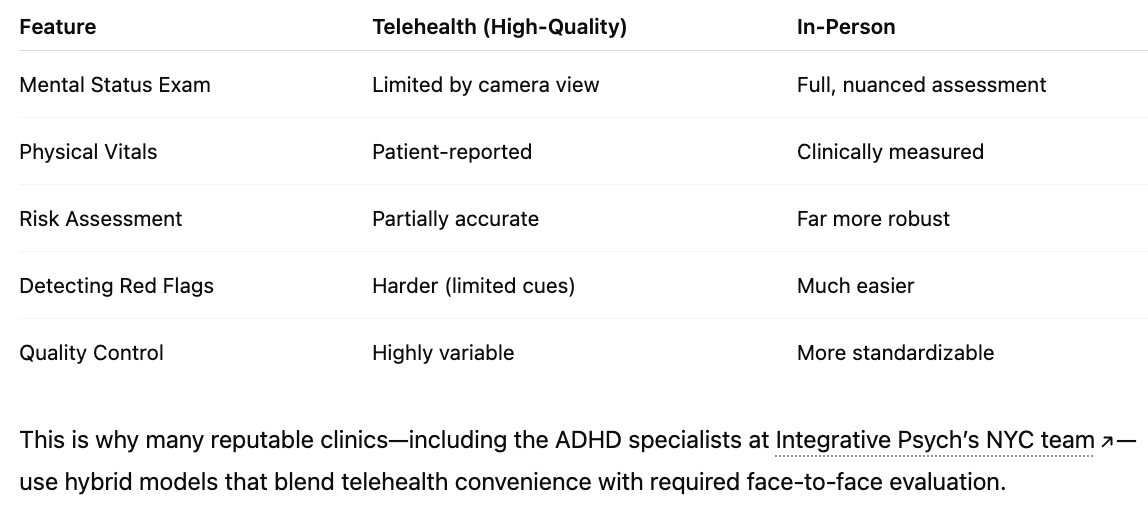November 20, 2025
Learn how telehealth prescribing for ADHD works, new safety rules, risks, and why in-person evaluation remains essential.
Telehealth exploded during the COVID-19 pandemic. For many patients—especially those with ADHD—it offered unprecedented access to psychiatric care. Virtual appointments reduced wait times, eased scheduling burdens, and expanded care to rural or mobility-limited individuals.
But telehealth prescribing for ADHD became controversial when certain high-volume platforms (often backed by private equity or insurer-owned conglomerates) began diagnosing ADHD in 5–10 minute appointments, prescribing controlled stimulants with minimal evaluation, and marketing aggressively on social media.
Dr. Ryan Sultan, a leading psychiatrist and ADHD researcher, emphasizes:
“Telehealth rules for stimulants existed for a reason. Stimulants are high-risk medications. In-person evaluation is a small ask for something as substantial as a controlled substance.”
Many clinicians agree: telehealth has a place, but stimulant prescribing must be done responsibly, with comprehensive evaluation and safeguards in place.
Stimulant medications such as Adderall, Vyvanse, Ritalin, and Concerta are classified as Schedule II controlled substances due to risks including:
These risks are even higher for individuals with co-occurring mental-health conditions such as anxiety, depression, OCD, bipolar disorder, psychosis, schizophrenia, or eating disorders, all of which require careful psychiatric assessment.
Therefore, high-quality ADHD evaluation routinely includes:
This depth is difficult—often impossible—to replicate with rushed or low-quality telehealth models.
During the pandemic, the federal government temporarily loosened telehealth rules to maintain access to care. This allowed clinicians to prescribe stimulants without in-person visits.
But data soon revealed problems:
As Dr. Sultan warns:
“Telehealth rules must be rolled back to protect the public and maintain a minimal level of public safety and quality healthcare.”
Today, many experts advocate for a hybrid model:
A thorough ADHD evaluation—whether in person or hybrid—must include a psychiatric mental status exam. This is especially important because ADHD can mimic or overlap with:
Proper evaluation is critical—and this is where high-quality care settings like Integrative Psych, and their teams in both NYC and Miami, differ from high-volume telehealth startups.

This is why many reputable clinics—including the ADHD specialists at Integrative Psych’s NYC team—use hybrid models that blend telehealth convenience with required face-to-face evaluation.
Dr. Sultan emphasizes:
“The evaluation of ADHD is far superior in person—where a mental status exam can be properly completed.”
In-person exams better detect:
These elements can dramatically change diagnosis and treatment, especially when considering:
These risks underscore the necessity for appropriate guardrails.
Responsible telehealth is still extremely valuable. Clinics such as Integrative Psych’s Miami psychiatrists embrace ethical virtual care while maintaining safety standards.
Ethical telehealth includes:
This stands in stark contrast to profit-driven “fast ADHD evaluations” that prioritize volume over patient welfare.
Telehealth prescribing must also account for populations with unique vulnerabilities, including individuals seeking:
These clinical needs often interact with ADHD symptoms—and must be evaluated with nuance that telehealth shortcuts often miss.
Integrative Psych is a national leader in responsible psychiatric care, offering evidence-based ADHD evaluations, diagnostic clarification, and safe prescribing practices. Their team includes board-certified psychiatrists, psychologists, and therapists specializing in:
Care is accessible through both in-person and virtual appointments. Learn more through:

We're now accepting new patients
